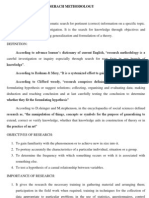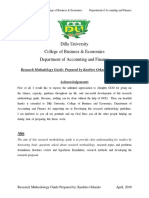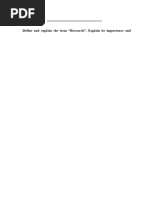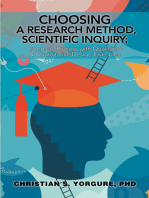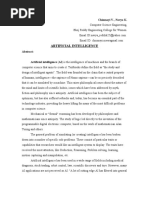0 ratings0% found this document useful (0 votes)
65 viewsPertanyaan Bing-1
Pertanyaan Bing-1
Uploaded by
Hera1. The purpose of business research is to investigate problems in the workplace that require solutions through systematic, controlled, empirical, and critical investigation of phenomena concerning managerial decision makers.
2. The scope of management research includes general business, marketing, finance, management, information systems, and human resources. The scope of accounting research includes financial accounting, capital markets, management accounting, auditing, and taxation.
3. Business research can be classified based on objectives, problem characteristics, and data type. Applied research prioritizes practical applications over pure theory building.
Copyright:
© All Rights Reserved
Available Formats
Download as DOCX, PDF, TXT or read online from Scribd
Pertanyaan Bing-1
Pertanyaan Bing-1
Uploaded by
Hera0 ratings0% found this document useful (0 votes)
65 views6 pages1. The purpose of business research is to investigate problems in the workplace that require solutions through systematic, controlled, empirical, and critical investigation of phenomena concerning managerial decision makers.
2. The scope of management research includes general business, marketing, finance, management, information systems, and human resources. The scope of accounting research includes financial accounting, capital markets, management accounting, auditing, and taxation.
3. Business research can be classified based on objectives, problem characteristics, and data type. Applied research prioritizes practical applications over pure theory building.
Original Description:
Ff
Original Title
pertanyaan bing-1
Copyright
© © All Rights Reserved
Available Formats
DOCX, PDF, TXT or read online from Scribd
Share this document
Did you find this document useful?
Is this content inappropriate?
1. The purpose of business research is to investigate problems in the workplace that require solutions through systematic, controlled, empirical, and critical investigation of phenomena concerning managerial decision makers.
2. The scope of management research includes general business, marketing, finance, management, information systems, and human resources. The scope of accounting research includes financial accounting, capital markets, management accounting, auditing, and taxation.
3. Business research can be classified based on objectives, problem characteristics, and data type. Applied research prioritizes practical applications over pure theory building.
Copyright:
© All Rights Reserved
Available Formats
Download as DOCX, PDF, TXT or read online from Scribd
Download as docx, pdf, or txt
0 ratings0% found this document useful (0 votes)
65 views6 pagesPertanyaan Bing-1
Pertanyaan Bing-1
Uploaded by
Hera1. The purpose of business research is to investigate problems in the workplace that require solutions through systematic, controlled, empirical, and critical investigation of phenomena concerning managerial decision makers.
2. The scope of management research includes general business, marketing, finance, management, information systems, and human resources. The scope of accounting research includes financial accounting, capital markets, management accounting, auditing, and taxation.
3. Business research can be classified based on objectives, problem characteristics, and data type. Applied research prioritizes practical applications over pure theory building.
Copyright:
© All Rights Reserved
Available Formats
Download as DOCX, PDF, TXT or read online from Scribd
Download as docx, pdf, or txt
You are on page 1of 6
1.
what is the purpose of business research
Business Research
To investigate a problem that arises in the world of work that requires a solution. And
a systematic, controlled, empirical, and critical investigation of a phenomenon that
concerns the managerial decision maker
2. xplain what is included in the scope of business research
a) the scope of management research
The scope of management research includes general business, marketing, finance,
management and organizational behavior, management information systems,
operations management, and human resource management.
b) the scope of accounting research.
The scope of accounting research includes financial accounting, capital markets,
management accounting, auditing, accounting information systems, and
3. explain the classification in business research
a) Based on the Research Objectives;
Basic Research, namely research that aims to develop
Applied Research, namely research that emphasizes problem solving.
b) Based on the Characteristics of the Problem;
Historical Research, is a study of problems related to past phenomena.
Descriptive research, a study of problems in the form of the current facts of a
population.
Correlational research, is research with the characteristics of problems in the form
of correlational relationships between two or more variables.
Comparative Causal Research, a study with the characteristics of problems in the
form of a causal relationship between two or more variables.
Experimental research, which is similar to comparative causal research, but there
are treatments for independent variables.
c) Based on the Data Type;
Opinion Research is research on facts in the form of opinions or opinions of people /
respondents.
Empirical Research, is a study of empirical facts obtained based on observation or
experience.
4. how many types of research are included in the applied research ,mention it
a) Applied research as exploratory research
b) Applied Research as Verification Research
c) Applied Research as Development Research
d) Applied Research as Laboratory Research
e) Applied Research as Literature Research
f) Applied Research as Field Research
g) Applied Research as Descriptive Research
h) Applied Research as Inferential Research
5. Are there separate criteria for problem selection in applied research? if there is
explain
The problem of applied research must be something that is useful to be solved that is
concrete in accordance with the reality of life and the data can be collected
objectively, completely and precisely
6. What is the difference that stands out from basic research and applied research
Basic research:
if a research is pure and has a purpose to find a generalization or a theory or a certain
principle
Applied research:
if a research in its aim gives priority to the practical aspect (application in the field)
7. Explain the characteristics of business research
Characteristics of business research are critical, and analytical, logical, objective,
conceptual and theoretical, empirical and systematic.
Critical and analytical, encourages a certainty and the process of inquiry to identify
problems and methods to get the solution.
Logical, refers to the method of scientific argumentation. The conclusion is rationally
derived from the available evidence.
Objective, implies that the results obtained by other scientists will be the same if the
studies conducted under the same conditions. The research results are said to be
scientific if they can be proven true.
Conceptual & Theoretical, science implies the development of conceptual and
theoretical structures to guide and direct research efforts.
Empirical, the principle rests on reality.
Systematic, a procedure that is careful and follows certain standard rules.
8. what is meant by scientific research
scientific research is a systematic and objective activity to study a problem in an
effort to achieve an understanding of its fundamental and generally accepted
principles (theories) about the problem. Research conducted, guided by various
information (which is manifested as theories) that have been produced in previous
studies, and the aim is to add or perfect existing theories about the problems that are
subject to study.
In contrast to unscientific research, scientific research is carried out based on
scientific methods. The scientific method is a framework for the foundation of
scientific knowledge. In science it is done by using methods of observation,
experimentation, generalization, and verification. Whereas in the social and cultural
sciences, the majority are carried out using interview and observation methods;
experimentation, generalization, and verification are also carried out in research
activities by experts in the fields of social sciences and cultural knowledge to obtain
certain research results in accordance with the objectives of the research.
9. mention and explain the characteristics of scientific research
1. Purposiveness, clear goal focus;
2. Rigor, thorough, has a good theoretical basis and design methodology;
3. Testibility, the hypothesis testing procedure is clear
4. Replicability, Testing can be repeated for the same or similar cases;
5. Objectivity, based on facts from actual data: not subjective and emotional;
6. Generalizability, the wider the scope of the use of the results the more useful;
7. Precision, approaching the reality and confidence of the chance of occurrence of
estimates can be seen;
8. Parsimony, Simplicity in the presentation of problems and research methods.
10. How do researchers in applying research methods use instruments or tools, so
that the data obtained is better?
The selection of research methods and instruments is very much determined by a
number of things, namely the object of research, the source of data, the time and funds
available, the number of researchers, and the techniques that will be used to process
the data when it has been collected. It is possible that someone is eager to use the
interview method to collect data, but because the time available is narrow, then use a
questionnaire. Likewise, researchers might want to use the method of careful
observation of objects, but the method of observation requires a long time and
adequate skills.
1. Tujuan Penelitian Bisnis
Untuk menyelidiki suatu masalah yang muncul dalam dunia kerja yang
memerlukan solusi.dan investigasi yang sistematis, terkontrol, empiris,
dan kritis mengenai suatu fenomena yang menjadi perhatian pengambil
keputusan manajerial
2. Ruang lingkup penelitian bisnis,
a) lingkup penelitian manajemen
Lingkup penelitian manajemen meliputi bisnis umum, pemasaran,
keuangan, manajemen dan perilaku organisasional, sistem informasi
manajemen, manajemen operasi, dan manajemen sumber daya manusia.
b) lingkup penelitian akuntansi.
Lingkup penelitian akuntansi meliputi akuntansi keuangan, pasar
modal, akuntansi manajemen, auditing, sistem informasi akuntansi, dan
perpajakan
3. klasifikasi penelitian bisnis
a) Berdasarkan Tujuan Penelitian;
Penelitian Dasar, yaitu penelitian yang bertujuan untuk mengembangkan
Penelitian Terapan, yaitu penelitian yang menekankan pada pemecahan
masalah.
b) Berdasarkan Karakteristik Masalah;
Penelitian Historis, merupakan penelitian terhadap masalah-masalah yang
berkaitan dengan fenomena masa lalu.
Penelitian Deskriptif, merupakan penelitian terhadap masalah-masalah
berupa fakta-fakta saat ini dari suatu populasi.
Penelitian Korelasional, merupakan penelitian dengan karakteristik
masalah berupa hubungan korelasional antara dua variabel atau lebih.
Penelitian Kausal Komparatif, merupakan penelitian dengan
karakteristik masalah berupa hubungan sebab-akibat antara dua variabel
atau lebih.
Penelitian Eksperimen, merupakan penelitian yang serupa dengan
penelitian kausal komparatif, tetapi ada perlakuan terhadap variabel
independen.
c) Berdasarkan Jenis Data;
Penelitian Opini, merupakan penelitian terhadap fakta berupa opini atau
pendapat orang/responden.
Penelitian Empiris, merupakan penelitian terhadap fakta empiris yang
diperoleh berdasarkan observasi atau pengalaman.
4. Jenis-jenis penelitian terapan
a) Penelitian Terapan sebagai penelitan eksploratif
b) Penelitian Terapan sebagai Penelitian Verifikatif
c) Penelitan Terapan sebagai Penelitian Pengembangan
d) Penelitan Terapan sebagai Penelitian Laboratorium
e) Penelitan Terapan sebagai Penelitian Kepustakaan
f) Penelitan Terapan sebagai Penelitian Lapangan
g) Penelitan Terapan sebagai Penelitiadeksriptif
h) Penelitan Terapan sebagai Penelitian Inferensial
5. kriteria pemilihan masalah dalam penelitian terapan
Masalah penelitian terapan harus sesuatu yag berguna untuk diselesaikan yang
bersifat konkret sesuai dengan realita kehidupan dan datanya dapat dikumpul
secara objektif, lengkap dan tepat
6. Perbedaan penelitian dasar dan penelitian terapan
Penelitian dasar :
apabila sebuah penelitian bersifat murni dan mempunyai tujuan untuk
menemukan suatu generalisasi atau teori atau prinsip tertentu
Penelitian terapan :
apabila sebuah penelitian dalam tujuannya mengutamakan segi praktis
( penerapan di lapangan )
7. Karaketeristik penelitian bisnis adalah kritis, dan analitis, logis, objektif,
konseptual dan teoritis, empiris dan sistematis.
Bersifat kritis dan analitis, mendorong suatu kepastian dan proses penyelidikan
untuk mengidentifikasi masalah dan metode untuk mendapatkan soulusinya.
Logis, merujuk pada metode dari argumentasi ilmiah. Kesimpulan secara rasional
diturunkan dari bukti-bukti yang ada.
Objektif, mengandung makna bahwa hasil yang diperoleh ilmuwan yang lain
akan sama apabila studi yang dilakukan pada kondisi yang sama. Hasil penelitian
dikatakan ilmiah apabila dapat dibuktikan kebenarannya.
Konseptual & Teoritis, ilmu pengetahuan mengandung arti pengembangan
struktur konsep dan teoritis untuk menuntun dan mengarahkan upaya penelitian.
Empiris, prinsipnya bersandar pada realitas.
Sistematis, suatu prosedur yang cermat dan mengikuti aturan tertentu yang baku.
8. Apa yang membedakan penelitian ilmiah dan penelitian tidak ilmiah
penelitian ilmiah adalah suatu kegiatan yang sistematik dan obyektif untuk
mengkaji suatu masalah dalam usaha untuk mencapai suatu pengertian mengenai
prinsip-prinsipnya yang mendasar dan berlaku umum (teori) mengenai masalah
tersebut. Penelitian yang dilakukan, berpedoman pada berbagai informasi (yang
terwujud sebagai teori-teori) yang telah dihasilkan dalam penelitian-penelitian
terdahulu, dan tujuannya adalah untuk menambah atau menyempurnakan teori
yang telah ada mengenai masalah yang menjadi sasaran kajian.
Berbeda dengan penelitian tidak ilmiah, penelitian ilmiah dilakukan dengan
berlandaskan pada metode ilmiah. Metode ilmiah adalah suatu kerangka landasan
bagi terciptanya pengetahuan ilmiah. Dalam sains dilakukan dengan
menggunakan metode pengamatan, eksperimen, generalisasi, dan verifikasi.
Sedangkan dalam ilmu-ilmu sosial dan budaya, yang terbanyak dilakukan dengan
menggunakan metode wawancara dan pengamatan; eksperimen, generalisasi, dan
verifikasi juga dilakukan dalam kegiatan-kegiatan penelitian oleh para ahli dalam
bidang-bidang ilmu-ilmu sosial dan pengetahuan budaya untuk memperoleh hasil-
hasil penelitian tertentu sesuai dengan tujuan penelitiannya.
9. sebut dan jelaskan Ciri-ciri dari penelitian ilmiah
a) Purposiveness, fokus tujuan yang jelas;
b) Rigor, teliti, memiliki dasar teori dan disain metodologi yang baik;
c) Testibility, prosedur pengujian hipotesis jelas
d) Replicability, Pengujian dapat diulang untuk kasus yang sama atau yang
sejenis;
e) Objectivity, Berdasarkan fakta dari data aktual : tidak subjektif dan
emosional;
f) Generalizability, Semakin luas ruang lingkup penggunaan hasilnya
semakin berguna;
g) Precision, Mendekati realitas dan confidence peluang kejadian dari
estimasi dapat dilihat; Parsimony, Kesederhanaan dalam pemaparan
masalah dan metode penelitiannya.
10. Bagaimana seorang peneliti di dalam rnenerapkan metode penelitian
menggunakan instrumen atau alat, agar data Yang diperoleh lebih baik?
Pemilihan metode dan instrumen penelitian sangat ditentukan oleh beberapa
hal, yaitur objek penelitian, sumber data, waktu, dan dana yang tersedia, jumlah
tenaga peneliti, dan teknik yang akan digunakan untuk Mengolah data bila sudah
terkumpul. Mungkin saja seseorang ingin sekali menggunakan metode wawancara
untuk mengumpulkan data tetapi karena Waktu yang tersedia sempit, lalu
menggunakan angket. Demikian juga mungkin peneliti ingin menggunakan
metode pengamatan secara cermat terhadap objek, tetapi metode pengamatan
memerlukan waktu lama dan keterampilan yang memadai.
11. Menurut anda apa saja hambatan penelitian ilmiah.
Penelitian dalam bidang sosial memiliki keterbatasan karena tidak selalu
menghasilkan informasi yang pasti. Kesulitan juga mungkin ditemui dalam memperoleh
sampel yang representatif, membatasi kemampuan generalisasi dari temuan. Tetapi tidak
berarti bahwa penelitian dalam bidang sosial termasuk manajemen tidak dapat mencapai
taraf ilmiah. Hanya karena dalam bidang social terdapat penggunaan intuisi dan perasaan
sehingga data yang diperoleh bersifat subjektif. Sampai sebatas bahwa penelitian ini
dirancang untuk memastikan kebermaksudan, ketelitian, dan kemungkinan testability
maksimum, pengulangan, generalisasi, objektivitas, penghematan, dan presisi dan
keyakinan, kita akan berusaha untuk terlibat dalam penyelidikan ilmiah.
12.
You might also like
- QuizDocument9 pagesQuizParanthaman Raman100% (2)
- Individual Plan For Professional Development (PPD)Document26 pagesIndividual Plan For Professional Development (PPD)Jovenil BacatanNo ratings yet
- CMP806 - Research Methods-SolutionDocument10 pagesCMP806 - Research Methods-SolutionOdunuga JuliusNo ratings yet
- QuestionSet For ResearchDocument36 pagesQuestionSet For ResearchMuhammad AliNo ratings yet
- Ressearch Full NotesDocument63 pagesRessearch Full NotesSree AnujaNo ratings yet
- Course ContentsDocument13 pagesCourse ContentsAtik MahmudNo ratings yet
- Research MethodologyDocument7 pagesResearch Methodologysamikasan0516No ratings yet
- Research Methodology and Technical WritingDocument7 pagesResearch Methodology and Technical Writingmrsukesh67% (3)
- Bbs 3350 Research Methodology 1Document39 pagesBbs 3350 Research Methodology 1AnthonyNo ratings yet
- RM Notes 1 To 3Document29 pagesRM Notes 1 To 3PrachikarambelkarNo ratings yet
- Research Methodology by DR Joginder Singh: Sample Questionnaires/ SchedulesDocument7 pagesResearch Methodology by DR Joginder Singh: Sample Questionnaires/ SchedulesSan JayNo ratings yet
- BTL RM NotesDocument82 pagesBTL RM NotesnagarajanNo ratings yet
- Research for Gelila 2022 GoferieDocument82 pagesResearch for Gelila 2022 GoferieEyob DerejeNo ratings yet
- Research BBS4th Year Chapter 2.pdfDocument57 pagesResearch BBS4th Year Chapter 2.pdfshashisinghrajput858No ratings yet
- Unit 1 BRMDocument49 pagesUnit 1 BRMAyush SengarNo ratings yet
- Psych-RESEARCH UNIT-1Document19 pagesPsych-RESEARCH UNIT-1ricopatalinghug73No ratings yet
- Research MethodologyDocument27 pagesResearch Methodologysoumencha50% (2)
- Shrenik's ProjectDocument26 pagesShrenik's ProjectShrenik LuniyaNo ratings yet
- Uncovering The Mysteries of ResearchDocument7 pagesUncovering The Mysteries of ResearchAyush NautiyalNo ratings yet
- Research Method Notes (ME)Document20 pagesResearch Method Notes (ME)Soma3010No ratings yet
- Research MethodologyDocument225 pagesResearch MethodologyFLAVIANNo ratings yet
- Unit 1: Careful Investigation or Inquiry Specially Through Search For New Facts in Any Branch of Knowledge."Document6 pagesUnit 1: Careful Investigation or Inquiry Specially Through Search For New Facts in Any Branch of Knowledge."Sayed Abdul SaboorNo ratings yet
- Dilla University College of Business & Economics Department of Accounting and FinanceDocument39 pagesDilla University College of Business & Economics Department of Accounting and FinanceShew ThomasNo ratings yet
- Metodologi PenelitianDocument21 pagesMetodologi PenelitianTasya Felicia MacellinNo ratings yet
- Research MethodologyDocument48 pagesResearch Methodologyashwath44100% (9)
- MBA Research MtdsDocument241 pagesMBA Research MtdsBarzala CarcarNo ratings yet
- LECTURE 2024 25 Research for Various SubjectsDocument34 pagesLECTURE 2024 25 Research for Various SubjectsEmman Nuel Dela CruzNo ratings yet
- Assignment 1 Research Skills PDFDocument5 pagesAssignment 1 Research Skills PDFVardaSamiNo ratings yet
- ch1 ResearchDocument21 pagesch1 ResearchMuste HanaNo ratings yet
- Research Methodology: Nahda International College Pharmacy Program 2020-2021Document31 pagesResearch Methodology: Nahda International College Pharmacy Program 2020-2021Basil DomiNo ratings yet
- Research Methodology NotesDocument31 pagesResearch Methodology NotesEnlightened ExplorerNo ratings yet
- All Meeting SummaryDocument19 pagesAll Meeting SummaryKristiani SimorangkirNo ratings yet
- Research Assignment Unit 1Document8 pagesResearch Assignment Unit 1Yujan TamrakarNo ratings yet
- Types of ResearchDocument5 pagesTypes of Researchqueenillarfylloh20No ratings yet
- RM NotesDocument11 pagesRM NotesHarish SrinivasNo ratings yet
- Criminological ResearchDocument15 pagesCriminological ResearchMelanie HadiNo ratings yet
- RM Unit 1-2 MaterialDocument24 pagesRM Unit 1-2 MaterialDev KotechaNo ratings yet
- Introduction To Business Research: Prof. Naveen K Shetty PGDMS & RC, SIT, TumkurDocument11 pagesIntroduction To Business Research: Prof. Naveen K Shetty PGDMS & RC, SIT, TumkurN Manu ManuNo ratings yet
- Meaning of Research in Word Lesson 2Document9 pagesMeaning of Research in Word Lesson 2mary ngeruNo ratings yet
- Research NoteDocument11 pagesResearch Notemagardiwakar11No ratings yet
- INTRODUCTION Research Methodology Presentation1Document17 pagesINTRODUCTION Research Methodology Presentation1Walda HamadNo ratings yet
- Business Research MethodDocument138 pagesBusiness Research Methodeyerusalem tesfaye100% (1)
- Reading Material Research Methods in Management (cp-207) PDFDocument16 pagesReading Material Research Methods in Management (cp-207) PDFchowba singhNo ratings yet
- Research Methodology L-2Document12 pagesResearch Methodology L-2PRITI DAS100% (1)
- Academic Research MethodsDocument5 pagesAcademic Research MethodsPrabhakarDeshpandeNo ratings yet
- Advanced Composition and Initiation To Research - S4 - G3 - ZaidDocument31 pagesAdvanced Composition and Initiation To Research - S4 - G3 - ZaidKai KokoroNo ratings yet
- Om Sakthi Business Research Methods: Unit-2Document12 pagesOm Sakthi Business Research Methods: Unit-2avvm007No ratings yet
- Mor 1Document28 pagesMor 1Adrimar AquinoNo ratings yet
- Research MethodologyDocument73 pagesResearch MethodologyDawaNo ratings yet
- The Nature of Research MethodsDocument32 pagesThe Nature of Research Methodsjaneth pallangyoNo ratings yet
- Research MethodologyDocument8 pagesResearch MethodologyRafiulNo ratings yet
- Unit 4 Research DesignDocument20 pagesUnit 4 Research Designgosaye desalegn100% (2)
- 09 - Chapter 3 PDFDocument14 pages09 - Chapter 3 PDFRomeo AliNo ratings yet
- Research MethodologyDocument14 pagesResearch Methodologygaetan signeNo ratings yet
- Business Research Methods .PPT by AnindyaDocument49 pagesBusiness Research Methods .PPT by Anindyaanindya_kundu88% (24)
- Extra Study MaterialDocument12 pagesExtra Study MaterialSubham ChakrabortyNo ratings yet
- Chapter 4Document9 pagesChapter 4Abreham AwokeNo ratings yet
- Choosing a Research Method, Scientific Inquiry:: Complete Process with Qualitative & Quantitative Design ExamplesFrom EverandChoosing a Research Method, Scientific Inquiry:: Complete Process with Qualitative & Quantitative Design ExamplesNo ratings yet
- Research Proposal a Simplified Step-by-Step Guide - Revised EditionFrom EverandResearch Proposal a Simplified Step-by-Step Guide - Revised EditionNo ratings yet
- It Should Be Made Compulsory For Everyone To Pass English in SPMDocument2 pagesIt Should Be Made Compulsory For Everyone To Pass English in SPMSakit Perut Kot100% (3)
- Risk Analysis: Group Members: Reshma Ravindran Sidhiq Shamweel Vinod VipinDocument18 pagesRisk Analysis: Group Members: Reshma Ravindran Sidhiq Shamweel Vinod VipinReshma AnandNo ratings yet
- DEMONSTRATION in Facilitate Learning SessionDocument25 pagesDEMONSTRATION in Facilitate Learning SessionCamille Dela PeñaNo ratings yet
- Copy 2Document1 pageCopy 2Raymart Javee Dumayas JuarezNo ratings yet
- 8608Document34 pages8608Naveed Syed100% (4)
- The Effectiveness of Collaborative Strategic Reading 1Document22 pagesThe Effectiveness of Collaborative Strategic Reading 1Aqilah MishaNo ratings yet
- Artificial Intelligence: Chinmayi V., Navya KDocument14 pagesArtificial Intelligence: Chinmayi V., Navya Kkaboom123No ratings yet
- Further Note-Taking StrategiesDocument9 pagesFurther Note-Taking StrategiesIlgın AkgözNo ratings yet
- Lesson Plan Matrix Guiding Questions Objectives Assessment Activities To Support Objectives and AssessmentDocument2 pagesLesson Plan Matrix Guiding Questions Objectives Assessment Activities To Support Objectives and AssessmentPRINCIPALNo ratings yet
- Quiz 2Document5 pagesQuiz 2Đạt ĐàoNo ratings yet
- Revision SistematicaDocument11 pagesRevision SistematicaManuel AzabacheNo ratings yet
- CSS 11Document2 pagesCSS 11Arnan LizardoNo ratings yet
- 1 Statistics and Probability g11 Quarter 4 Module 1 Test of HypothesisDocument19 pages1 Statistics and Probability g11 Quarter 4 Module 1 Test of HypothesisKarlo LlarenaNo ratings yet
- Black Doodle Tools For Generating Ideas Infographic - 20240122 - 120628 - 0000Document1 pageBlack Doodle Tools For Generating Ideas Infographic - 20240122 - 120628 - 0000mnion67No ratings yet
- Action Research Proposal: Work Plan, Timelines and Cost EstimatesDocument10 pagesAction Research Proposal: Work Plan, Timelines and Cost EstimatesRENZ CARLO LEONATONo ratings yet
- Throwing Lesson PlanDocument2 pagesThrowing Lesson Planapi-296320588No ratings yet
- Hypothesis Testing v2.0Document40 pagesHypothesis Testing v2.0Estelle CantemprateNo ratings yet
- Toefl: Speaking Skills UpperDocument9 pagesToefl: Speaking Skills UpperJean TeofiloNo ratings yet
- The Development of E-Modules Project Based Learning For Students of Computer and Basic Networks at Vocational SchoolDocument6 pagesThe Development of E-Modules Project Based Learning For Students of Computer and Basic Networks at Vocational SchoolTRI NURHASANAHNo ratings yet
- Nora C. EnglandDocument11 pagesNora C. EnglandAlphaOmegaStrifeNo ratings yet
- Teacher InterviewDocument7 pagesTeacher Interviewapi-310540176No ratings yet
- Day 4 Fossil Fuels Lesson PlanDocument3 pagesDay 4 Fossil Fuels Lesson Planapi-308499386No ratings yet
- Biological Sciences Yr 5 Primary Science FPDDocument18 pagesBiological Sciences Yr 5 Primary Science FPDapi-502522476No ratings yet
- School Recovery and Readiness Plan 2022-2023Document9 pagesSchool Recovery and Readiness Plan 2022-2023EVANGELINE DAILEGNo ratings yet
- Reasoning and Aptitude Test 2 SeptDocument34 pagesReasoning and Aptitude Test 2 SeptrajashekarpulaNo ratings yet
- Syllabus - Teaching Social StudiesDocument3 pagesSyllabus - Teaching Social StudiesAngielyn TorrinuevaNo ratings yet
- Organizational Behavior: Eighteenth EditionDocument38 pagesOrganizational Behavior: Eighteenth EditionAbdus Salam RatanNo ratings yet






